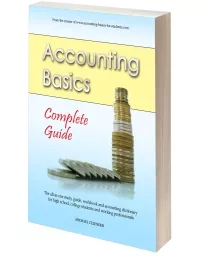How do the Journal Entries Translate into the Profit and Loss and/or Balance Sheet?
And Why As a Business Owner Should I Know Debits and Credits?
by Bryan
(Fort Worth, TX, US)
Q: In your example you show how the entry is made on a GL I believe. How does that translate into the business's documents? Would it be recorded on the P&L and/or the balance sheet? Dr and Cr does not show up on the P&L but it does on the balance sheet if I recall (it is too late for me to look it up). I guess what I really want to know is, why should I care about Dr and Cr if I am a business owner? I can use an income and expense ledger to document most transactions after all. How would those other documents benefit me?
I do run a small business and I own some rental properties. My background is managerial accounting so documenting Dr and Cr is not something I worry about. I understand it conceptually (a little) from accounting 101 but I cannot seem to make the leap to put it into place in everyday use. Nor do I understand why I should worry about it...except to have a nagging feeling that I should.
A: Some great questions Bryan and I totally understand where you're coming from.
Your first question was: "How does that (accounting entries of debit and credit) translate into the business's documents (financial reports)? Would it be recorded on the P&L and/or the balance sheet?"
I would recommend first taking a look at the lesson on the accounting cycle. It gives a big picture of how journals, T-accounts and financial reports all fit together. The lesson also includes a great diagram of the accounting procedure or steps, from source documents right through to the financial statements and also displays images of each individual accounting step.
You stated that "Dr and Cr does not show up on the P&L but it does on the balance sheet..." This is incorrect. Dr and Cr definitely show up on the profit and loss statement. Journal entries involving incomes or expenses will always affect the profit and loss statement (also known as income statement).
Likewise, journal entries involving assets, liabilities or owners equity will always affect the balance sheet. The balance sheet is literally the accounting equation of assets, owners equity and liabilities in a vertical format.
All journal entries (debits and credits) affect either the income statement or the balance sheet, and sometimes both.
Your second but related question was, "why should I care about Dr and Cr if I am a business owner? I can use an income and expense ledger to document most transactions after all. How would those other documents benefit me?"
A journal entry is the record of an individual transaction, such as Joe Shmoe paying you rent for one month. Understanding journal entries allows you to check the records of specific transactions.
Journal entries are recorded in the journals. There are seven journals, each covering specific types of transactions. See this lesson on accounting journals for more details.
T-accounts are summary records of a specific item in your records such as a loan with the bank, or office furniture you own. If you understand T-accounts you can easily check this summary record regarding an item in your records. You can see chronologically what has happened with something financially. With a loan, you could see when you took out the loan, balances at the beginning of the year, when and how much was repaid, etc. Check out this lesson on T-accounts for more information.
Now, it is not essential as a business manager to know debits and credits or journals or T-accounts. Not absolutely essential. Understanding and being able to interpret the balance sheet and income statement is far more important, as these documents reflect how a business is doing as a whole. But there are some good reasons to know debits and credits and journals and T-accounts too.
Here are a few reasons to know debits and credits and supporting records/documents:
- You will have greater control over the financial aspect of your business as you will have a more in-depth understanding of your own record-keeping system.
- You will understand exactly what your accountant or bookkeeper is talking about when he says something like, "I passed an adjusting entry and the bank account now has a debit balance."
- You can spot errors (and/or fraud) far more easily by examining the records of accounting transactions yourself. Undetected fraud and/or errors can cost you quite a bit of money.
- It could save you hassle and money when your business is audited. Many businesses (especially larger businesses) are required to be audited. When an auditor spots anomalies in your records, he will spend more time at your business investigating. And his time is definitely worth money. The more anomalies and errors he spots, the longer he will spend at your business, and the more he will charge you for his or her services. If you understand debits and credits you stand a better chance of getting costly mistakes corrected earlier, so the auditor does not have to spend time investigating and correcting them for you and charge you for this.
- Understanding debits and credits will give you even better understanding and ability to interpret financial reports like the P&L and balance sheet.
By the way, you may not know this, but there is a strong link between the financial accounting concept of the basic accounting equation and the managerial accounting concepts of investing and financing. Check out this lesson called The Basic Accounting Equation: Another Viewpoint for more details.
Return to Ask a Question About This Lesson!.
© Copyright 2009-2021 Michael Celender. All Rights Reserved.
Click here for Privacy Policy.



